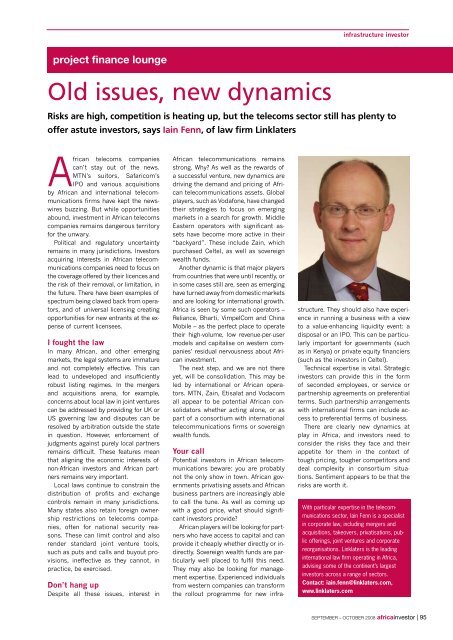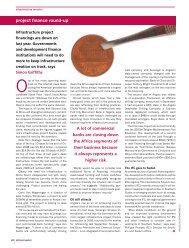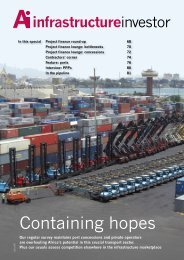Tower of power - Simon Griffiths
Tower of power - Simon Griffiths
Tower of power - Simon Griffiths
Create successful ePaper yourself
Turn your PDF publications into a flip-book with our unique Google optimized e-Paper software.
infrastructure investor<br />
project finance lounge<br />
Old issues, new dynamics<br />
Risks are high, competition is heating up, but the telecoms sector still has plenty to<br />
<strong>of</strong>fer astute investors, says Iain Fenn, <strong>of</strong> law firm Linklaters<br />
African telecoms companies<br />
can’t stay out <strong>of</strong> the news.<br />
MTN’s suitors, Safaricom’s<br />
IPO and various acquisitions<br />
by African and international telecommunications<br />
firms have kept the newswires<br />
buzzing. But while opportunities<br />
abound, investment in African telecoms<br />
companies remains dangerous territory<br />
for the unwary.<br />
Political and regulatory uncertainty<br />
remains in many jurisdictions. Investors<br />
acquiring interests in African telecommunications<br />
companies need to focus on<br />
the coverage <strong>of</strong>fered by their licences and<br />
the risk <strong>of</strong> their removal, or limitation, in<br />
the future. There have been examples <strong>of</strong><br />
spectrum being clawed back from operators,<br />
and <strong>of</strong> universal licensing creating<br />
opportunities for new entrants at the expense<br />
<strong>of</strong> current licensees.<br />
I fought the law<br />
In many African, and other emerging<br />
markets, the legal systems are immature<br />
and not completely effective. This can<br />
lead to undeveloped and insufficiently<br />
robust listing regimes. In the mergers<br />
and acquisitions arena, for example,<br />
concerns about local law in joint ventures<br />
can be addressed by providing for UK or<br />
US governing law and disputes can be<br />
resolved by arbitration outside the state<br />
in question. However, enforcement <strong>of</strong><br />
judgments against purely local partners<br />
remains difficult. These features mean<br />
that aligning the economic interests <strong>of</strong><br />
non-African investors and African partners<br />
remains very important.<br />
Local laws continue to constrain the<br />
distribution <strong>of</strong> pr<strong>of</strong>its and exchange<br />
controls remain in many jurisdictions.<br />
Many states also retain foreign ownership<br />
restrictions on telecoms companies,<br />
<strong>of</strong>ten for national security reasons.<br />
These can limit control and also<br />
render standard joint venture tools,<br />
such as puts and calls and buyout provisions,<br />
ineffective as they cannot, in<br />
practice, be exercised.<br />
Don’t hang up<br />
Despite all these issues, interest in<br />
African telecommunications remains<br />
strong. Why As well as the rewards <strong>of</strong><br />
a successful venture, new dynamics are<br />
driving the demand and pricing <strong>of</strong> African<br />
telecommunications assets. Global<br />
players, such as Vodafone, have changed<br />
their strategies to focus on emerging<br />
markets in a search for growth. Middle<br />
Eastern operators with significant assets<br />
have become more active in their<br />
“backyard”. These include Zain, which<br />
purchased Celtel, as well as sovereign<br />
wealth funds.<br />
Another dynamic is that major players<br />
from countries that were until recently, or<br />
in some cases still are, seen as emerging<br />
have turned away from domestic markets<br />
and are looking for international growth.<br />
Africa is seen by some such operators –<br />
Reliance, Bharti, VimpelCom and China<br />
Mobile – as the perfect place to operate<br />
their high-volume, low revenue-per-user<br />
models and capitalise on western companies’<br />
residual nervousness about African<br />
investment.<br />
The next step, and we are not there<br />
yet, will be consolidation. This may be<br />
led by international or African operators.<br />
MTN, Zain, Etisalat and Vodacom<br />
all appear to be potential African consolidators<br />
whether acting alone, or as<br />
part <strong>of</strong> a consortium with international<br />
telecommunications firms or sovereign<br />
wealth funds.<br />
Your call<br />
Potential investors in African telecommunications<br />
beware: you are probably<br />
not the only show in town. African governments<br />
privatising assets and African<br />
business partners are increasingly able<br />
to call the tune. As well as coming up<br />
with a good price, what should significant<br />
investors provide<br />
African players will be looking for partners<br />
who have access to capital and can<br />
provide it cheaply whether directly or indirectly.<br />
Sovereign wealth funds are particularly<br />
well placed to fulfil this need.<br />
They may also be looking for management<br />
expertise. Experienced individuals<br />
from western companies can transform<br />
the rollout programme for new infrastructure.<br />
They should also have experience<br />
in running a business with a view<br />
to a value-enhancing liquidity event: a<br />
disposal or an IPO. This can be particularly<br />
important for governments (such<br />
as in Kenya) or private equity financiers<br />
(such as the investors in Celtel).<br />
Technical expertise is vital. Strategic<br />
investors can provide this in the form<br />
<strong>of</strong> seconded employees, or service or<br />
partnership agreements on preferential<br />
terms. Such partnership arrangements<br />
with international firms can include access<br />
to preferential terms <strong>of</strong> business.<br />
There are clearly new dynamics at<br />
play in Africa, and investors need to<br />
consider the risks they face and their<br />
appetite for them in the context <strong>of</strong><br />
tough pricing, tougher competitors and<br />
deal complexity in consortium situations.<br />
Sentiment appears to be that the<br />
risks are worth it.<br />
With particular expertise in the telecommunications<br />
sector, Iain Fenn is a specialist<br />
in corporate law, including mergers and<br />
acquisitions, takeovers, privatisations, public<br />
<strong>of</strong>ferings, joint ventures and corporate<br />
reorganisations. Linklaters is the leading<br />
international law firm operating in Africa,<br />
advising some <strong>of</strong> the continent’s largest<br />
investors across a range <strong>of</strong> sectors.<br />
Contact: iain.fenn@linklaters.com,<br />
www.linklaters.com<br />
september – october 2008 africainvestor | 95









